
Summary
- RPGs often include co-op gameplay, romantic activities, fetch quests, loyalty missions, and criminal activities.
- Side quests like guild-specific requests and optional heroism add depth and variety to RPG games.
- Players expect engaging boss fights, professional cartography tasks, and meaningful choices to impact gameplay.
Role-playing games usually follow a template to ensure that fans get to enjoy everything they expect from these titles. Sure, some RPGs try to break the mold and stand out in a bid to wow fans with their uniqueness, but this happens once in a blue moon.
Most RPGs with amazing execution will wow fans with ease, allowing them to enjoy some incredible adventures that will have them on the edge of their seats. The side quests in these games are what usually draw in players, with many fans loving the variety of this content.
Romantic Activities
Let’s Players Woo The Partner Of Their Choice
Romancing other characters has become quite common in most video games, especially in the role-playing genre. Players expect the biggest RPGs around to feature some sort of romance that players can pursue when they want to put the main quest on the back burner.
This usually involves optional quests where players help out their potential romance partner, ensuring that they pick the options that will help them get closer to a character they’re enamored with. After putting in enough effort, seeing these relationships blossom makes for a satisfying moment.
Fetch Quests
The Most Infamous Side Quest In Any RPG
This is the bane of many RPG players’ existence. Ever since MMOs became very popular, the fetch quest structure has bled into several other role-playing games, with players hating the act of farming materials and finding items for a character in a different corner of the map.
However, some developers can put in effort to make these simple fetch quests as engaging as they can be. The Witcher 3 is a great example of this, with Geralt actively scoffing at the idea of being an errand boy, even if it pays well. One of the fetch quests about retrieving a woman’s frying pan becomes a memorable quest that hints at an important character who will appear later on in the story.
Hunting Monsters (And Humans)
A Fun Combat Challenge Against Imposing Foes
Since most RPGs feature some form of a combat loop, it’s easy to see why hunting enemies in these games can become a viable side quest. Players can help locals clear out bandit hideouts, take out a fearsome beast, and anything else along the same lines.
This usually leads to memorable boss encounters where players put it all on the line to survive against a powerful monster or a group of humans, taking them out and getting the reward they’re owed.
Loyalty Missions
Make Companions Trust In The Player
Mass Effect 2 is the first game that comes to mind when talking about loyalty missions. Without earning the trust of the crew, Shepard will be doomed in the Suicide Mission as his companions fall one by one.
However, these companion quests are present in almost every RPG where players travel in a group. BioWare games are notable for this quest structure, although titles like Baldur’s Gate 3 and Fallout: New Vegas also feature quests where players help out their friends whenever they have the time to spare.
Amateur Cartography
Explore Various Corners Of The Map
Most RPGs take place in open worlds or various semi-open hubs, allowing players to explore these areas to their heart’s content. Given how the hero is well-equipped to explore hostile locations without being torn to a pulp, it’s easy to see why NPCs with a thirst for knowledge would want to pay for the player’s services.
These characters will instruct the hero to scout a location and let them know everything about it. It’s a great way to encourage the player to explore the world, and all the loot they’ll acquire will be a welcome bonus.
Guild-Specific Requests
Join And Gain Ranks In Various Factions And Guilds
Most RPGs that let players enjoy the fantasy of living a virtual life add many things to flesh out these worlds and give players something to do. Bethesda games are known for enabling this by adding various guilds to their games, compelling players to start out from the lowest rung in these games before eventually making a name for themselves.
These guilds are just one of the many ways RPGs integrate certain groups into their games that players will love to join. This can apply to factions too, with games from Obsidian Entertainment and other titles letting players ally with or against certain factions, completing quests to further their interests.
Criminal Activities
Complete Illicit Requests To Gain Notoriety And Money
Most video games feature crime-fueled fantasies that let players perform illegal activities for money. While this usually ties into the main story for most games, there are some side quests in most RPGs that let players pursue a life of crime, too.
Robbing areas, conducting raids, assassinating targets, aiding political conspiracies — there’s no shortage of unique ways popular RPGs entice players into performing these criminal activities, especially if the pay is lucrative.
Optional Heroism
Players Love Saving People In Need, Even If They’re Total Strangers
One of the best things about most RPGs is how players will love being the hero. Saving people from the actions of horrible gangs and villains makes for an easy goal to try and achieve, especially once players are adored by the masses, and their heroic actions help them garner a positive reputation.
Sure, players can also go out of their way to make other people’s lives harder, but most people agree that most RPGs incentivize heroic actions. It just feels more satisfying to help good people out, and only a few RPGs know how to make an evil playthrough exciting.
#Types #Side #Quests #Present #RPG

